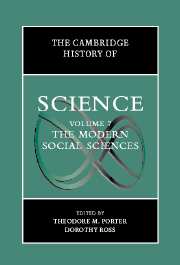Book contents
- Frontmatter
- 1 Introduction: Writing the History of Social Science
- PART I SCIENCES OF THE SOCIAL TO THE LATE NINETEENTH CENTURY
- PART II THE DISCIPLINES IN WESTERN EUROPE AND NORTH AMERICA SINCE ABOUT 1880
- 13 Changing Contours of The Social Science Disciplines
- 14 Statistics and Statistical Methods
- 15 Psychology
- 16 Economics
- 17 Political Science
- 18 Sociology
- 19 Anthropology
- 20 Geography
- 21 History and the Social Sciences
- PART III THE INTERNATIONALIZATION OF THE SOCIAL SCIENCES
- PART IV SOCIAL SCIENCE AS DISCOURSE AND PRACTICE IN PUBLIC AND PRIVATE LIFE
- Index
- References
17 - Political Science
from PART II - THE DISCIPLINES IN WESTERN EUROPE AND NORTH AMERICA SINCE ABOUT 1880
Published online by Cambridge University Press: 28 March 2008
- Frontmatter
- 1 Introduction: Writing the History of Social Science
- PART I SCIENCES OF THE SOCIAL TO THE LATE NINETEENTH CENTURY
- PART II THE DISCIPLINES IN WESTERN EUROPE AND NORTH AMERICA SINCE ABOUT 1880
- 13 Changing Contours of The Social Science Disciplines
- 14 Statistics and Statistical Methods
- 15 Psychology
- 16 Economics
- 17 Political Science
- 18 Sociology
- 19 Anthropology
- 20 Geography
- 21 History and the Social Sciences
- PART III THE INTERNATIONALIZATION OF THE SOCIAL SCIENCES
- PART IV SOCIAL SCIENCE AS DISCOURSE AND PRACTICE IN PUBLIC AND PRIVATE LIFE
- Index
- References
Summary
The idea that politics is, or can be, the subject of science is an ancient one that reaches back to Aristotle. Early modern expressions of the idea can be found in Machiavelli and Hobbes, as well as in Enlightenment thinkers from Hume to the American Founders. “Science” was understood as the systematic knowledge of first principles, whether prudential or philosophical, and “politics” as the public life of a city-state, kingdom, or republic. This old science of politics became remote in time and worldview during the nineteenth century with the flourishing of the democratic state and the empirical natural sciences. In 1835, Tocqueville foresaw the consequences in Democracy in America.:“A new political science is needed for a world itself quite new.”
The democratization of politics and the scientization of knowledge are two forces of modernity that explain the formation and transformation of the social sciences in general. But these forces are particularly crucial for understanding a “new” political science, given their conscious problematization by those who have styled themselves “political scientists.” Political scientists were unique among the emergent social disciplines in using “science” in their chosen name, and they made the politics of a democratic age their principal inquiry and fundamental problem. Like Tocqueville, they displayed considerable ambivalence about democracy and what they should do about its shape and progress. Democracy needed to be explained and understood. But it also needed to be educated, because citizens wanted improvement, administrators needed training, and officials required statecraft. To satisfy democracy’s needs and their own competing goals, political scientists looked to natural science as a model — either to emulate or against which to pattern their own methodologies and cultural authority.
Information
- Type
- Chapter
- Information
- The Cambridge History of Science , pp. 306 - 328Publisher: Cambridge University PressPrint publication year: 2003
References
Accessibility standard: Unknown
Why this information is here
This section outlines the accessibility features of this content - including support for screen readers, full keyboard navigation and high-contrast display options. This may not be relevant for you.Accessibility Information
- 9
- Cited by
